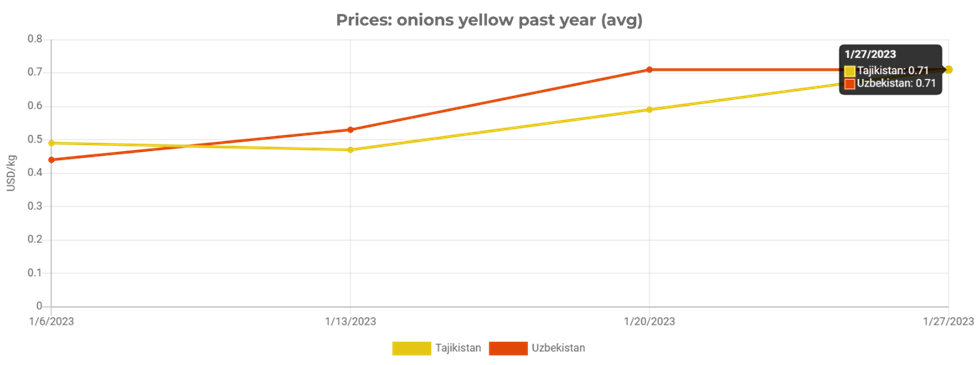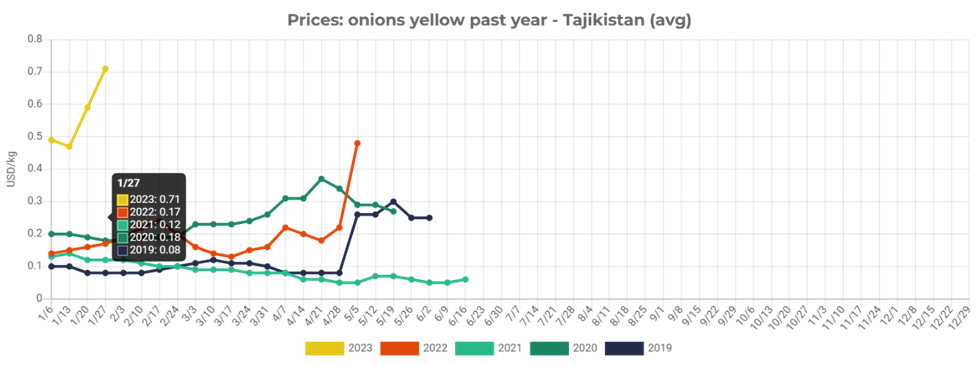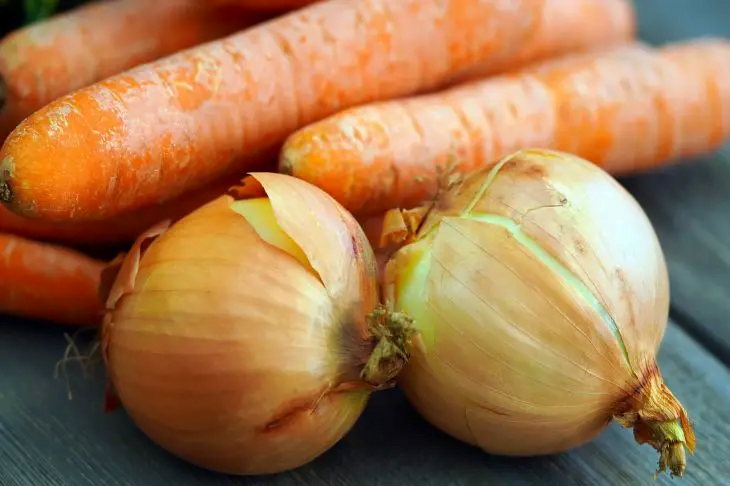A wave of bans on exports of fresh vegetables in the countries of Central Asia continues. After some deliberation, EastFruit team reports that Tajikistan decided to also ban exports to prevent local prices from soaring even more. Market participants learned about the export ban from the press conference of the Minister of Agriculture of Tajikistan, Kurbon Khakimzoda.
Export ban applies to onions, carrots, and potatoes. The duration of the ban is unknown at the moment. It is only stated that the restrictions will be in effect “until the stabilization of prices in the market of Tajikistan.” Earlier this month onion exports were also banned by Kazakhstan and Uzbekistan.
EastFruit experts note that the ban on onion exports from Tajikistan was already in place earlier this season and exports were allowed only for a very limited period of time. In the first half of the season, it was also forbidden to export Tajik onions, “in order to stabilize domestic prices.” However, at the moment, the price level for onions is so high that there is no big motivation to export anyhow. In particular, the prices for this product are approximately the same in neighboring Uzbekistan, which also banned exports of fresh onions earlier.
 It is unclear if exports of early vegetables will be allowed, which comprise a significant share of farmers’ incomes. In January 2023 Kazakhstan, which has the same problem with onions, signed an agreement to import 6,000 tons of early onions from Tajikistan but it is unclear if they ban is not lifted, this deal will not be materialized.
It is unclear if exports of early vegetables will be allowed, which comprise a significant share of farmers’ incomes. In January 2023 Kazakhstan, which has the same problem with onions, signed an agreement to import 6,000 tons of early onions from Tajikistan but it is unclear if they ban is not lifted, this deal will not be materialized.
However, as you can see in the chart below, onion prices in Tajikistan are indeed at an all-time high. And they are not so far from the shocking psychological level of $ 1 per kg. The probably of reaching this level we described in the onion global market review earlier this month.
 While situation with onions remains rather clear and prices are indeed alarmingly high, prices for carrots in Tajikistan remained stable even after the devastating frosts. Although now they are higher than in previous years, but they are not much higher. Therefore, the ban on carrot exports is most likely due to fears that the part of carrots stored in the ground during the winter (yes, there is such a storage technology in Tajikistan) could be damaged by frosts. Farmers will start harvesting these carrots within the next few weeks. At the same time, wholesale prices for carrots in Tajikistan are only half of the price in the neighboring Uzbekistan. However, they are higher than, for example, in Georgia.
While situation with onions remains rather clear and prices are indeed alarmingly high, prices for carrots in Tajikistan remained stable even after the devastating frosts. Although now they are higher than in previous years, but they are not much higher. Therefore, the ban on carrot exports is most likely due to fears that the part of carrots stored in the ground during the winter (yes, there is such a storage technology in Tajikistan) could be damaged by frosts. Farmers will start harvesting these carrots within the next few weeks. At the same time, wholesale prices for carrots in Tajikistan are only half of the price in the neighboring Uzbekistan. However, they are higher than, for example, in Georgia.
The situation with respect to potatoes in Tajikistan is even less tense than the situation with carrots. Potato prices jumped after the frosts, but they are not much higher than last year and are below the price levels of 2021. So far prices for potatoes in Tajikistan remain stable and are not showing signs of growth. Potato prices in Tajikistan are now also lower than in neighboring Uzbekistan and two times lower than in Georgia. Moreover, Tajikistan, in principle, does not export potatoes in any significant volumes, but is a net importer of it, buying them mainly in Pakistan and Russia.
Obviously, the decision to ban exports was just a safety net. By the way, exports of carrots from Tajikistan also are not very high. Moreover, in 2021 Tajikistan imported more than 1 thousand tons.
Onion is certainly the main export vegetable of Tajikistan. Tajikistan usually exports from 80 to 100 thousand tons of fresh onions per year. The main buyers of Tajik onions were Kazakhstan, Pakistan, Russia and Afghanistan.
The use of the site materials is free if there is a direct and open for search engines hyperlink to a specific publication of the East-Fruit.com website.




